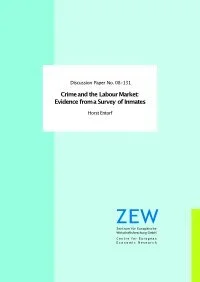Crime and the Labour Market: Evidence from a Survey of Inmates
By Horst Entorf.
Economists think that unemployment is an important cause for crime. From the theoretical point of view, this belief seems to be reasonable, since, according to the standard economic theory of crime by Nobel laureate Gary Becker , unemployed individuals are per definition excluded from legal income opportunities, and, thus, more likely to commit crimes than people who have a job. Empirical evidence is less clear. Econometric studies often show ambiguous signs for the effect of unemployment on crime. The main problem is the lack of adequate micro data. In this study based on a survey of 1,771 inmates conducted in 31 German prisons, the focus is on (expected) recidivism, not on criminal activity in general. Instead of re-contacting former inmates after their release (which would cause the problem of losing sight of most re-offending inmates), we interviewed prisoners about the perceived probability of their own future recidivism. Results show that inmates with poor labour market prospects expect a significantly higher rate of future recidivism. Having a closer look at subgroups of prisoners reveals that drug and alcohol addiction cause adverse effects. Thus, improving prisoner health care by installing effective anti-drug programmes would be one of the most effective measures against crime.
Mannheim: ZEW – Leibniz Centre for European Economic Research, 2008. 26p.


